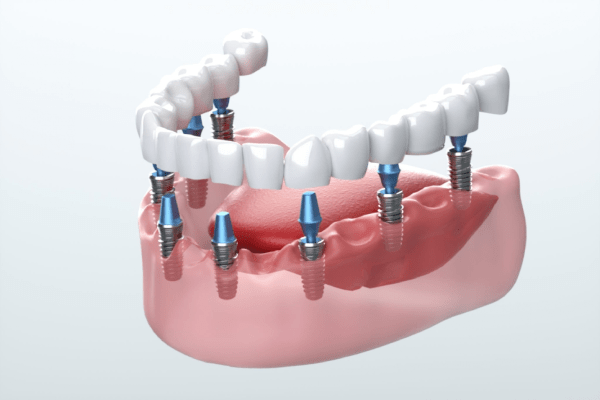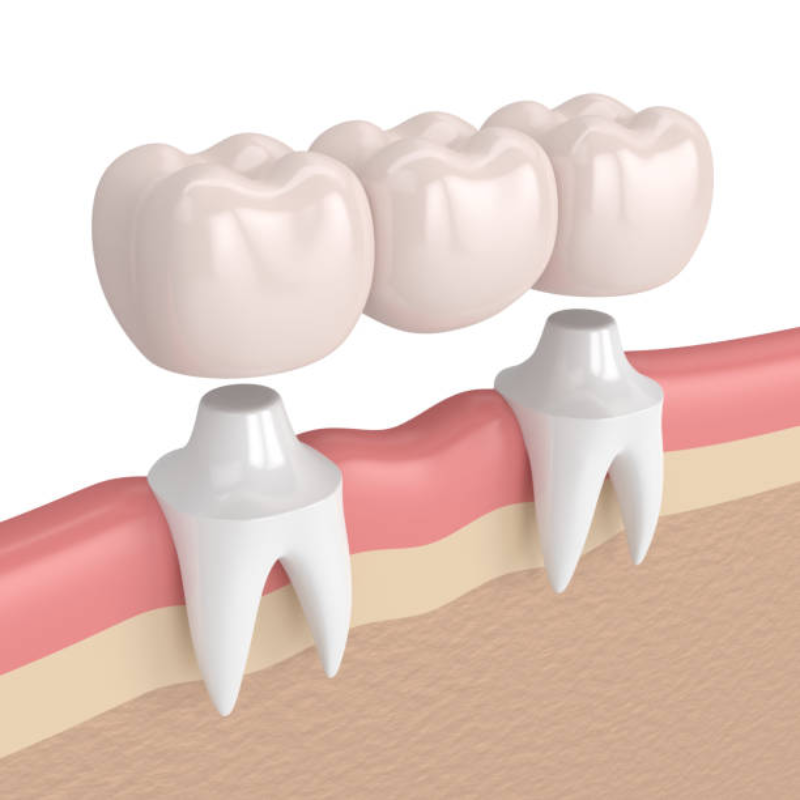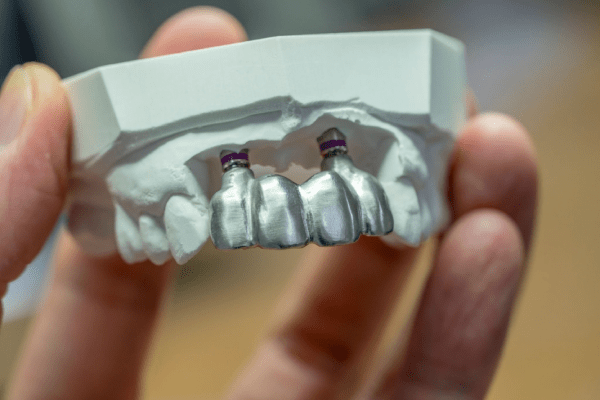Dental Bridge Treatment Alternatives in Turkey: What Are Your Options?
What is Dental Bridge?
A dental bridge is a dental appliance used to replace one or more missing teeth by bridging the gap between the remaining natural teeth. A dental bridge consists of one or more false teeth, also known as pontics, that are attached to two dental crowns placed over the remaining natural teeth. Dental bridges are designed to restore the appearance and function of the mouth, as well as to prevent further dental problems that can arise due to missing teeth, such as gum disease, tooth decay, and bone loss. There are several types of dental bridges available, including traditional bridges, cantilever bridges, Maryland bridges, and implant-supported bridges, each with their own advantages and disadvantages. Ultimately, the type of dental bridge used will depend on the individual’s specific dental needs and preferences.
Procedure for Dental Bridge Treatment
The procedure for dental bridge treatment involves several steps, including an initial consultation, preparation of the abutment teeth, taking impressions, fitting the bridge, and making final adjustments. During the initial consultation, the dentist will examine the patient’s teeth and gums to determine if they are a good candidate for dental bridge treatment. If the patient is a good candidate, the dentist will prepare the abutment teeth by removing a portion of the enamel to make room for the dental crowns. The dentist will then take impressions of the patient’s teeth and send them to a dental laboratory, where the bridge will be fabricated. Once the bridge is ready, the dentist will fit the bridge to the patient’s teeth and make any final adjustments.

Types and Characteristics of Dental Bridges
Dental bridges are a popular dental appliance used to replace one or more missing teeth by bridging the gap between the remaining natural teeth. There are several types of dental bridges available, each with their own characteristics and advantages.
- Traditional Bridges
Traditional bridges are the most common type of dental bridge and involve attaching a false tooth or teeth to two dental crowns that are placed over the remaining natural teeth on either side of the gap. The dental crowns are typically made of porcelain or ceramic, which is matched to the color of the natural teeth. Traditional bridges are strong and durable, but they do require the removal of some of the natural tooth enamel to make room for the dental crowns.
- Cantilever Bridges
Cantilever bridges are similar to traditional bridges, but they only require one dental crown to support the false tooth or teeth. Cantilever bridges are used when there is only one remaining natural tooth next to the gap. While cantilever bridges are less invasive than traditional bridges, they may not be as strong or durable, especially if they are supporting multiple false teeth.
- Maryland Bridges
Maryland bridges involve attaching a false tooth or teeth to a metal or porcelain framework that is bonded to the back of the remaining natural teeth on either side of the gap. Maryland bridges are less invasive than traditional bridges because they do not require the removal of any natural tooth enamel. However, they may not be as strong or durable, especially if they are supporting multiple false teeth.
- Implant-Supported Bridges
Implant-supported bridges involve placing dental implants in the jawbone to support the false tooth or teeth. Dental implants are small titanium posts that are surgically inserted into the jawbone and allowed to fuse with the bone over time. Once the implants have fused with the bone, the false tooth or teeth are attached to the implants using abutments. Implant-supported bridges are strong, durable, and long-lasting, but they are also the most invasive and expensive type of dental bridge.
Ultimately, the type of dental bridge used will depend on the individual’s specific dental needs and preferences. It is important to consult with a dentist to determine the best type of dental bridge for each individual case.
Candidates for Dental Bridge Treatment
Dental bridge treatment is suitable for individuals who have one or more missing teeth. Additionally, candidates for dental bridge treatment may have weakened teeth that cannot support a dental implant, or they may have jawbone issues that make dental implants unsuitable. Individuals who have good oral hygiene habits and healthy gums are also good candidates for dental bridge treatment.
How long do dental bridges last?
Dental bridges can last up to 10-15 years with proper care and maintenance.
Disadvantages of Dental Bridge Treatment
While dental bridge treatment can be an effective solution for missing teeth, there are some disadvantages to consider. One potential disadvantage is that the natural teeth that support the bridge may become damaged over time. Additionally, dental bridge treatment can be expensive, especially if multiple teeth need to be replaced. Finally, there is a risk of decay and gum disease around the abutment teeth and under the bridge, which can lead to further dental problems if not properly cared for.
Alternatives to Dental Bridge Treatment
While dental bridges are a popular solution for missing teeth, there are several alternative treatments available that may be better suited to some individuals. Here are some alternatives to dental bridge treatment and their features:
- Dental Implants
Dental implants are a popular alternative to dental bridges, as they involve placing a small titanium post into the jawbone to support the false tooth or teeth. Once the implant has fused with the bone, a dental crown is attached to the implant to create a natural-looking replacement tooth. Dental implants are strong, durable, and long-lasting, and they do not require the removal of any natural tooth enamel. However, dental implants are more expensive than dental bridges and may require more invasive surgery.
- Partial Dentures
Partial dentures are another option for individuals with missing teeth. Partial dentures are removable dental appliances that attach to the remaining natural teeth using metal or plastic clasps. The false teeth are attached to the denture base, which is made of a gum-colored material that blends in with the natural gums. Partial dentures are less invasive and less expensive than dental implants, but they may not be as comfortable or natural-looking as dental bridges or implants.
- Resin-Bonded Bridges
Resin-bonded bridges, also known as Maryland bridges, involve attaching a false tooth or teeth to a metal or porcelain framework that is bonded to the back of the remaining natural teeth on either side of the gap. Resin-bonded bridges are less invasive than traditional bridges because they do not require the removal of any natural tooth enamel. They are also less expensive than dental implants and are often used for front teeth that do not undergo as much biting force. However, they may not be as strong or durable as other options and can come loose.
Ultimately, the best alternative to dental bridge treatment will depend on each individual’s specific dental needs and preferences. It is important to consult with a dentist to determine the best treatment option for each case.
Dental Bridge Treatment in Turkey
Dental bridge treatment is a common dental procedure that is also available in Turkey. Turkey has become a popular destination for medical tourism, and dental procedures such as dental bridge treatment are among the most sought-after treatments in the country.
Dental bridge treatment in Turkey is performed by licensed and experienced dentists who use state-of-the-art equipment and techniques to ensure optimal results. The cost of dental bridge treatment in Turkey is often lower than in many other countries, making it an attractive option for individuals who may not be able to afford the procedure in their home country.
Many dental clinics and hospitals in Turkey offer dental bridge treatment, and patients can choose from a variety of dental bridges, including traditional bridges, cantilever bridges, Maryland bridges, and implant-supported bridges. Patients should consult with their dentist to determine the best type of dental bridge for their specific dental needs and preferences.
In addition to dental bridge treatment, many dental clinics and hospitals in Turkey also offer a range of other dental services, including cosmetic dentistry, orthodontics, and oral surgery. Patients who travel to Turkey for dental bridge treatment can also take advantage of the country’s rich cultural heritage and tourist attractions, making it a popular destination for both medical and leisure tourism.
Best Cities to Get Dental Bridge Treatment in Turkey
Turkey is a popular destination for medical tourism, including dental bridge treatment. There are many cities in Turkey where patients can receive high-quality dental bridge treatment, but here are some of the best cities to consider:
- Istanbul
Istanbul is Turkey’s largest city and a popular destination for medical tourism. The city is home to many dental clinics and hospitals that offer dental bridge treatment using state-of-the-art equipment and techniques. Patients can also take advantage of Istanbul’s rich history and cultural heritage, with many tourist attractions and activities to explore.
- Kuşadası
Kuşadası, another popular destination for medical tourism. The city has many dental clinics and hospitals that offer dental bridge treatment, with experienced dentists and modern facilities. Kuşadası is also home to many cultural and historical attractions, making it a great place for patients to combine dental treatment with sightseeing.
- Antalya
Antalya is a coastal city in southern Turkey that is known for its beautiful beaches and historical sites. The city also has many dental clinics and hospitals that offer dental bridge treatment, with skilled dentists and advanced technology. Patients can enjoy the natural beauty of the city while receiving dental treatment.
- Izmir
Izmir is a coastal city in western Turkey that is known for its rich history and culture. The city has many dental clinics and hospitals that offer dental bridge treatment, with experienced dentists and advanced equipment. Patients can enjoy the seaside views and explore the city’s cultural and historical landmarks.
In conclusion, the best city for dental bridge treatment in Turkey will depend on each individual’s specific needs and preferences. You should research and choose a reputable dental clinic or hospital in your desired city and consider travelling and accommodation costs. As Cure Holiday, we can ensure your comfort during your treatment process with treatment packages that cover all your expenses with treatment in the best clinics, taking into account all your costs.

Dental Bridge Costs in Turkey 2023
Dental bridge treatment costs in Turkey can vary depending on the type of bridge being used, the number of missing teeth being replaced, and the location of the dental clinic or hospital. However, dental bridge treatment in Turkey is generally less expensive than in many other countries, making it an attractive option for individuals seeking affordable dental care.
The cost of traditional dental bridge treatment in Turkey can range from around $300 to $1,500 per tooth, depending on the material used for the dental crown and the location of the dental clinic or hospital. Cantilever bridges and resin-bonded bridges are typically less expensive, with costs ranging from around $200 to $1,000 per tooth.
Implant-supported bridges are generally the most expensive type of dental bridge, with costs ranging from around $1,000 to $2,500 per tooth. However, dental implant costs in Turkey are often lower than in many other countries, making implant-supported bridges more affordable.
It is important to choose a reputable dental clinic or hospital in Turkey to get high quality dental care and treatment results.
We can help you find the best dental bridge price and the best dental bridge conditions in Turkey, including Istanbul, Izmir, Kusadasi and Antalya.
